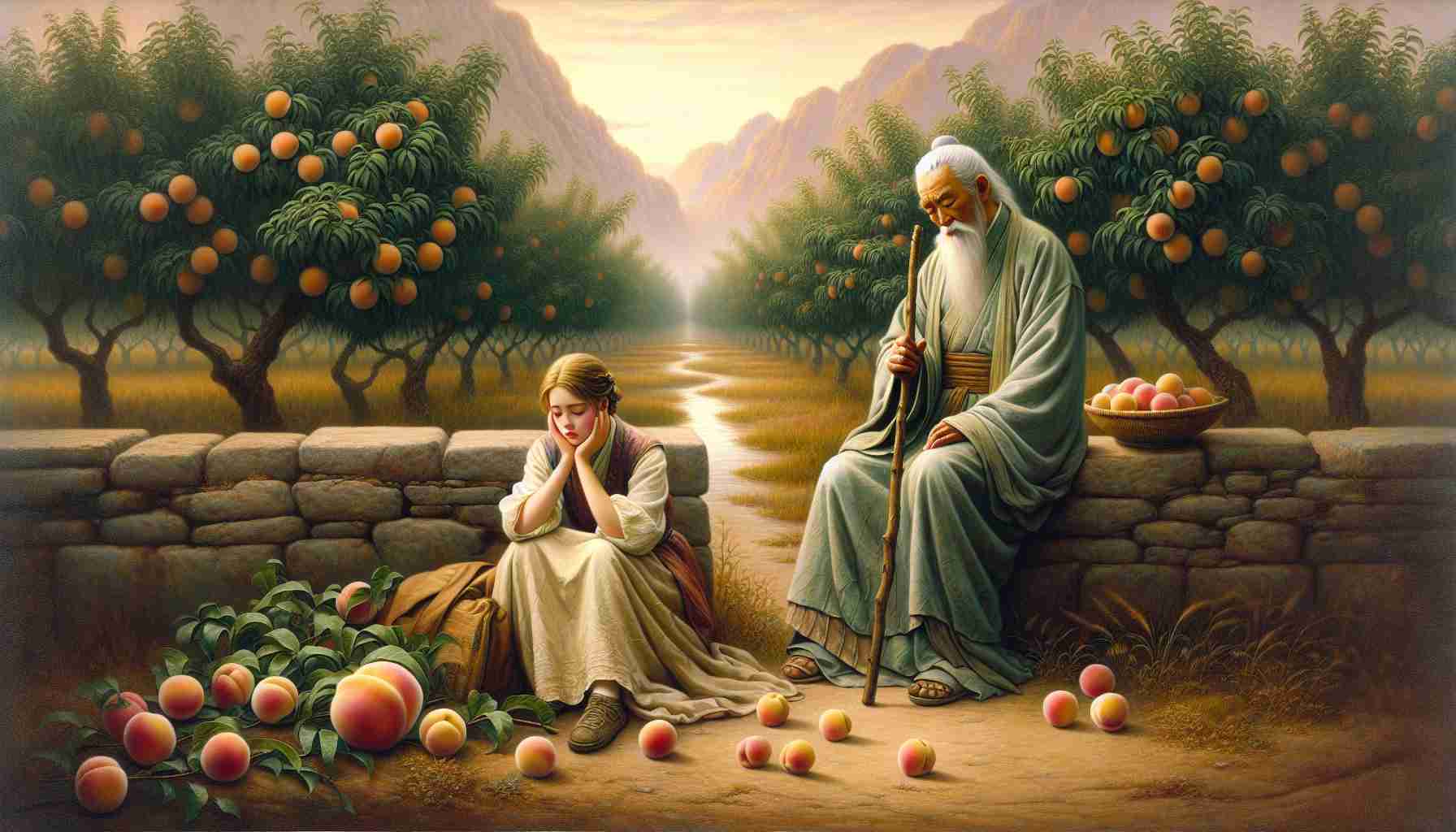

It was the busiest day of the harvest, and my arms ached from carrying baskets of peaches up the hill. My name is Lin, and I was twelve years old that summer. My family and I lived near the southern mountains, where we worked in the orchards all day. Father always said, “Work hard, and you’ll have peace.”
But no matter how hard I worked, peace never came. I rushed. I worried. I tried to pick the best peaches the fastest. I thought the more I pushed, the better I would be. But the more I rushed, the more I dropped fruit. I grew tired, clumsy, and angry at myself.
One day, as I spilled yet another basket on the path, I groaned and sat beside the orchard wall. The mountain breeze blew softly, and I buried my face in my hands. "Why can't I ever do enough?" I whispered.
Just then, an old man walked by, tapping a stick as he strolled. He wore a faded gray robe and a gentle smile. He looked up at the sky and then down at me.
“Why the heavy heart, young one?” he asked, though his voice wasn't pushing for an answer.
“I work so hard,” I said. “But I keep messing up. Everyone’s ahead, and I can’t catch up.”
The old man sat on a stone nearby. He picked up a fallen peach from the ground. "Have you ever watched a peach grow?"
I shook my head. "I just pick them."
He held the peach out in his palm. “It does not scream or rush to ripen,” he said. “It simply grows—slowly, quietly. It becomes sweet because it does nothing but be what it is.”
I frowned. "But I have to do something."
He chuckled. “Doing is not always better. Have you heard of Wu Wei?”
I hadn’t.
“It means non-action,” he said. “But not laziness. It means acting in harmony, not in force. Like water flowing around rocks.”
He pointed to the stream beside the path. “Water doesn’t fight. It curves. It waits. And still, it wears down stone.”
I watched the water move, gentle and sure. No rushing. No anger.
“I think I understand,” I whispered.
He smiled and stood. “Then today, walk slower. Breathe. Carry less and fall less.”
That afternoon, I picked peaches quietly. I didn’t rush. I noticed the sound of the wind, the warm smell of the fruit. I wasn’t the fastest—but I didn’t drop a single peach.
Since that day, I never forgot the lesson of the peach and the stream. I still worked, but I didn’t fight the flow. When things got hard, I remembered to pause and breathe.
I didn’t change overnight. But now, whenever I feel the urge to push too hard, I remember the old man’s words. I try to let things unfold as they are, trusting I don’t need to fight the river—just walk beside it.
It was the busiest day of the harvest, and my arms ached from carrying baskets of peaches up the hill. My name is Lin, and I was twelve years old that summer. My family and I lived near the southern mountains, where we worked in the orchards all day. Father always said, “Work hard, and you’ll have peace.”
But no matter how hard I worked, peace never came. I rushed. I worried. I tried to pick the best peaches the fastest. I thought the more I pushed, the better I would be. But the more I rushed, the more I dropped fruit. I grew tired, clumsy, and angry at myself.
One day, as I spilled yet another basket on the path, I groaned and sat beside the orchard wall. The mountain breeze blew softly, and I buried my face in my hands. "Why can't I ever do enough?" I whispered.
Just then, an old man walked by, tapping a stick as he strolled. He wore a faded gray robe and a gentle smile. He looked up at the sky and then down at me.
“Why the heavy heart, young one?” he asked, though his voice wasn't pushing for an answer.
“I work so hard,” I said. “But I keep messing up. Everyone’s ahead, and I can’t catch up.”
The old man sat on a stone nearby. He picked up a fallen peach from the ground. "Have you ever watched a peach grow?"
I shook my head. "I just pick them."
He held the peach out in his palm. “It does not scream or rush to ripen,” he said. “It simply grows—slowly, quietly. It becomes sweet because it does nothing but be what it is.”
I frowned. "But I have to do something."
He chuckled. “Doing is not always better. Have you heard of Wu Wei?”
I hadn’t.
“It means non-action,” he said. “But not laziness. It means acting in harmony, not in force. Like water flowing around rocks.”
He pointed to the stream beside the path. “Water doesn’t fight. It curves. It waits. And still, it wears down stone.”
I watched the water move, gentle and sure. No rushing. No anger.
“I think I understand,” I whispered.
He smiled and stood. “Then today, walk slower. Breathe. Carry less and fall less.”
That afternoon, I picked peaches quietly. I didn’t rush. I noticed the sound of the wind, the warm smell of the fruit. I wasn’t the fastest—but I didn’t drop a single peach.
Since that day, I never forgot the lesson of the peach and the stream. I still worked, but I didn’t fight the flow. When things got hard, I remembered to pause and breathe.
I didn’t change overnight. But now, whenever I feel the urge to push too hard, I remember the old man’s words. I try to let things unfold as they are, trusting I don’t need to fight the river—just walk beside it.